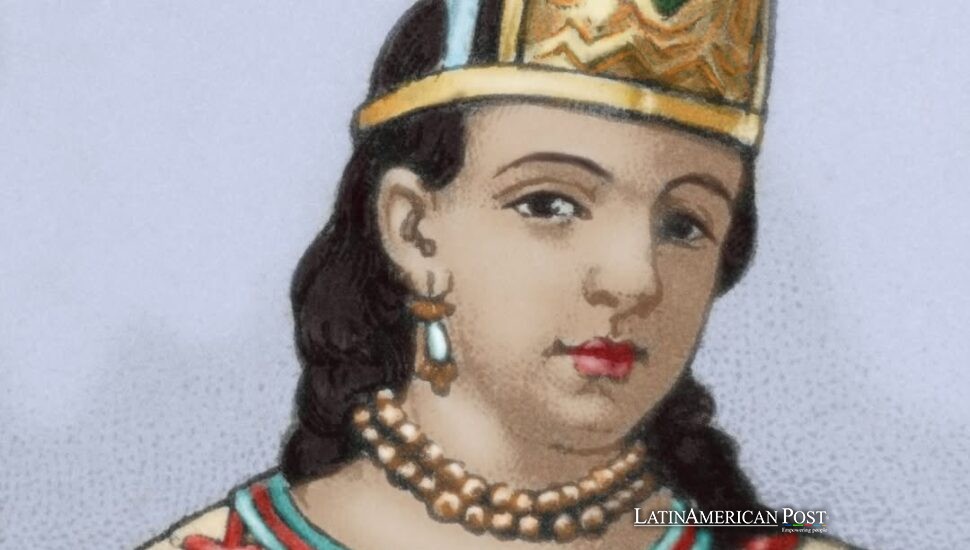Mexico Rewrites Malintzin’s Story: From Traitor to Translator of a Nation

Long condemned as the traitor who helped topple an empire, Malintzin—better known as La Malinche—is returning to Mexico’s center stage. As new cultural events begin, historians, feminists, and Indigenous thinkers are asking whether her true legacy is betrayal, survival, or audacious agency.
A Woman of Many Names and Fewer Choices
Spain called her Marina. Nahua towns remembered her as Malintzin. Later, the nation branded her La Malinche—a name sharpened into an insult. Each label tells the same story: she was never allowed to name herself.
Born around 1500 in what is now southern Mexico, she spoke Náhuatl, Oluteco, and later multiple Mayan dialects, before learning Spanish. Her life was a sequence of exchanges—sold, gifted, baptized, handed over—a woman moved like property across the chessboard of conquest.
“She was at their mercy as a victim,” Rutgers historian Camilla Townsend told the AP, describing how Indigenous women baptized after battle often endured sexual coercion cloaked in religion. Yet, Townsend added, “she saved her own life really by choosing to translate.”
That choice—made under duress—became her power. Translation was not freedom, but it was agency, the small, defiant kind that can alter outcomes in rooms filled with armed men. In a world collapsing under war, a young woman who learned the language of her captors made herself indispensable. Not to abet domination, but to survive it.
Courts of Conquest and the Burden of Translation
Imagine her at the first meeting in Tenochtitlan: Emperor Moctezuma surrounded by priests and warriors; Hernán Cortés hungry for gold, souls, and dominion; and between them, a teenager converting fear into words.
Translation, scholars remind us, is never neutral. It carries intent, tone, and risk. Townsend told the AP that Malintzin was “forced to be an intermediary between the Spaniards and these other poor women who were going to be raped.” At other moments, her words may have saved lives.
Cortés understood her worth. Townsend believes he arranged her marriage to a Spanish commander—the only way to keep her near his expedition without returning her to slavery. That arrangement made her visible in history, but it also made her vulnerable to myth.
Mixe linguist Yásnaya Aguilar told the AP that in her time Malintzin “moved from being a slave to being respected and honored by society,” so closely linked with Cortés that Malintzin sometimes referred to both of them. She was his voice; through her, power spoke.
None of this redeems conquest. But it complicates the reflex to brand her a traitor. In a Mesoamerica of competing city-states, the Mexica—Moctezuma’s people—were not automatically “her people.” Loyalty was local, survival immediate. The modern demand that she choose between patriotism and collaboration misreads her world entirely.
She stood in a storm where every choice was dangerous and silence could kill faster than words.
From Villain to Mirror in Mexico’s National Story
After her early death—likely from disease—Malintzin disappeared from the record. A century later, Mexico’s independence resurrected her as villain. Nation builders needed symbols, and she became the perfect cautionary tale: the woman who let foreigners in.
An 1826 novel painted her as a lustful betrayer; later, poet Octavio Paz turned her into the country’s original wound. “The Mexican people have not forgiven her betrayal,” he wrote, transforming a coerced teenager into an emblem of national shame. His interpretation—the “Malinche complex”—burrowed deep: to admire the foreign was to be malinchista, a sellout.
Meanwhile, the same state that condemned her imposed Spanish-only education, erasing Indigenous languages far more completely than she ever could.
At UNAM, historian Federico Navarrete told the AP that viewing her “objectively” is impossible because conquest’s hierarchies still structure Mexican life. She has become less a person than a mirror: some see humiliation, others hybridity, others a reckoning.
Since the 1970s, Chicana feminists have fought to reclaim her, arguing that she was not a symbol of betrayal but of creation—a woman who forged a bridge between worlds. As many scholars told the AP, her labor was linguistic, emotional, and intellectual. She didn’t destroy a civilization; she decoded it.
In this newer lens, Malintzin is no longer the mother of shame but the mother of language itself.
Reclaiming Malintzin—and What It Asks of Mexico
Now, the reclamation is official. Mexico’s first woman president, Claudia Sheinbaum, has launched a state-led effort to “vindicate” Malintzin, convening historians and anthropologists to restore her pre-Hispanic name. The AP reported that this initiative anchors cultural events celebrating her as a figure of resilience rather than reproach.
It’s a long-delayed reckoning. Indigenous communities never fully accepted the label of traitor; they named volcanoes, dances, and girls in her honor. Scholars like Townsend remind us that Malintzin didn’t conquer an empire—disease, steel, gunpowder, and European hunger did. She interpreted. She negotiated. She endured.
To vindicate her is not to absolve colonization. It’s to admit that Mexico’s origin story was never a duel of good versus evil but a labyrinth of coercion and survival. It’s to recognize that women have always stood at the hinge of history—not as passive symbols, but as actors who shaped outcomes even from the margins.
The risk, of course, is that the government replaces one myth with another—turning her from villain to saint, simplifying complexity into ceremony. But the opportunity is profound: to teach children that translation is power, that survival under domination is not sin, and that the story of Mexico began not in purity or betrayal but in plurality.
Malintzin likely died around 1529, in her early thirties, leaving two children—one with Cortés, one with her husband. She left behind no diary, only echoes. For five centuries, others have filled her silence with accusation or apology. Now Mexico faces its own test of translation: can it listen to her story with empathy instead of projection?
Also Read: The Colombian Farmer Who Taught Ecuador How to Taste Its Own Coffee
If it can, it will find not a traitor to condemn, but a teacher to understand—a woman who, in the face of conquest, seized the smallest tool within reach—language—and used it to survive, to connect, and to be heard across time.





